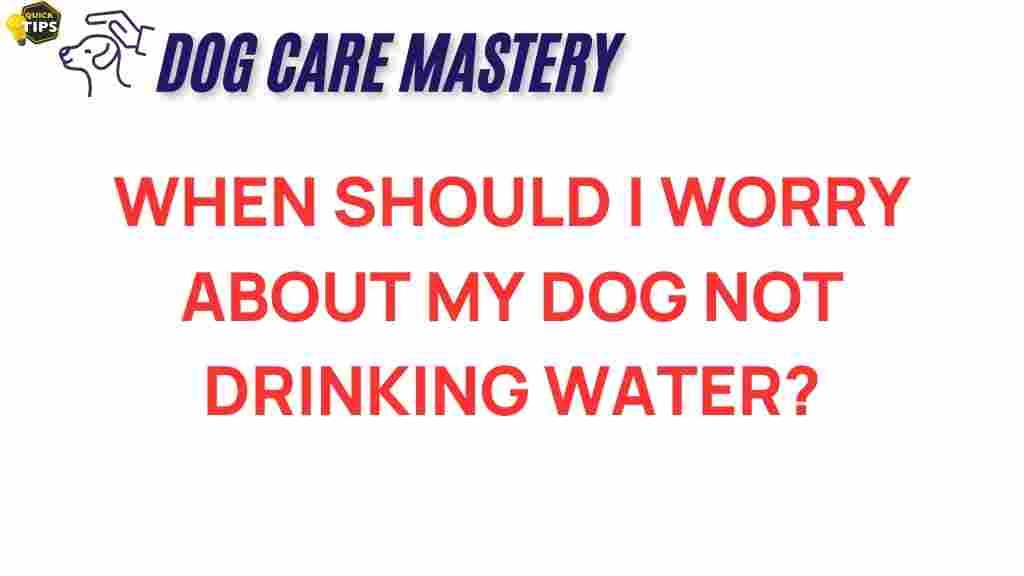When Should You Be Concerned About Your Dog’s Hydration Levels?
As a responsible dog owner, understanding your pet’s hydration levels is crucial for their health and well-being. Just like humans, dogs need an adequate amount of water to stay healthy. However, many pet owners may not realize when their furry friends are becoming dehydrated or when hydration levels drop to concerning levels. In this article, we will explore the importance of dog hydration, signs of dehydration, and when you should be worried about your dog’s hydration levels.
The Importance of Dog Hydration
Dog hydration is vital for numerous bodily functions, including:
- Regulating body temperature
- Supporting digestion
- Maintaining joint health
- Transporting nutrients
- Removing waste products
Without sufficient water intake, dogs can quickly become dehydrated, leading to severe health issues. This is especially critical during hot weather or after vigorous exercise, where water loss can occur rapidly.
How Much Water Should Your Dog Drink?
The amount of water a dog needs can vary based on several factors, including its size, age, activity level, and diet. As a general guideline, dogs should drink about 1 ounce of water per pound of body weight each day. For example, a 50-pound dog should consume approximately 50 ounces (or about 6.25 cups) of water daily. However, keep in mind that this amount may increase during hot weather or if your dog is exercising more than usual.
Signs of Dehydration in Dogs
Recognizing the signs of dehydration early is essential for prompt intervention. Here are some common symptoms to watch for:
- Excessive thirst: If your dog is drinking more water than usual, it may be trying to compensate for dehydration.
- Dry gums: Check your dog’s gums; they should be moist. If they feel sticky or dry, dehydration may be present.
- Loss of skin elasticity: Gently pinch the skin between your dog’s shoulder blades. If it doesn’t quickly return to its normal position, your dog may be dehydrated.
- Sunken eyes: Dehydrated dogs may have eyes that appear sunken or dull.
- Fatigue or lethargy: If your dog seems unusually tired or less active than normal, it may be a sign of dehydration.
- Vomiting or diarrhea: These can lead to rapid fluid loss, causing dehydration.
- Bad breath: A dog with dehydration may exhibit foul-smelling breath.
Causes of Dehydration in Dogs
Understanding the causes of dehydration can help you prevent it from occurring. Some common causes include:
- Hot weather: Dogs are susceptible to heat, and during hot days, they can become dehydrated quickly.
- Inadequate water supply: Ensure your dog always has access to fresh, clean water.
- Illness: Conditions like kidney disease, diabetes, or infections can lead to increased water loss.
- Diet: Dogs on dry kibble diets may need extra water compared to those on wet food diets.
- Exercise: Intense physical activity can lead to increased fluid loss through panting and sweating.
Step-by-Step Process to Monitor Your Dog’s Hydration
As a pet owner, you can take proactive steps to monitor and ensure your dog remains hydrated:
1. Regularly Check Water Bowl
Make it a habit to check your dog’s water bowl multiple times a day. Ensure it is always filled with fresh water. Consider investing in a pet water fountain, which can encourage your dog to drink more.
2. Observe Drinking Habits
Pay attention to how much water your dog consumes daily. Note any changes in their drinking habits. If you notice your dog drinking significantly more or less than usual, consult your veterinarian.
3. Conduct Daily Health Checks
Perform daily checks for signs of dehydration, including examining their gums, skin elasticity, and overall energy levels. This will help you catch any potential issues early.
4. Be Mindful of Weather Conditions
During hot weather, take extra precautions to ensure your dog stays hydrated. Consider bringing water on walks and providing shade during outdoor activities.
5. Adjust Diet as Needed
If your dog primarily eats dry kibble, consider incorporating wet food or adding water to dry kibble to boost hydration levels.
6. Consult Your Veterinarian
If you notice signs of dehydration or abnormal drinking habits, consult your veterinarian promptly. They can check for underlying health issues and provide guidance on appropriate hydration strategies.
Troubleshooting Tips for Dog Hydration Issues
If you suspect your dog is dehydrated, consider the following troubleshooting tips:
1. Encourage Drinking
If your dog refuses to drink, try the following:
- Add flavor: Mix in low-sodium chicken or beef broth to entice your dog to drink.
- Ice cubes: Many dogs enjoy chewing on ice cubes, which can help them hydrate.
- Wet food: Offering wet food can also help increase fluid intake.
2. Monitor and Limit Activity
If it’s particularly hot outside, limit your dog’s outdoor activities to the cooler parts of the day, such as early morning or late evening.
3. Provide Fresh Water
Always ensure your dog has access to fresh, clean water. Change the water regularly to encourage drinking and remove any contaminants.
4. Use Hydration Supplements
Consider using dog hydration supplements available at pet stores or through your veterinarian. These products can help replenish lost fluids and electrolytes.
5. Seek Veterinary Help
If dehydration persists or your dog exhibits severe symptoms, seek veterinary assistance immediately. Your veterinarian might administer intravenous fluids or other treatments to rehydrate your dog.
Conclusion
Understanding dog hydration is crucial for your pet’s overall health. Being aware of your dog’s hydration needs, signs of dehydration, and how to maintain their hydration levels will help ensure your furry friend stays healthy and happy. Remember, if you ever have concerns about your dog’s hydration or health, it’s always best to consult with your veterinarian.
For more tips on pet care, check out our pet care resources. Stay informed and keep your dog hydrated!
For additional information on the importance of hydration, visit the American Kennel Club website.
This article is in the category Health and created by dogcaremastery Team
